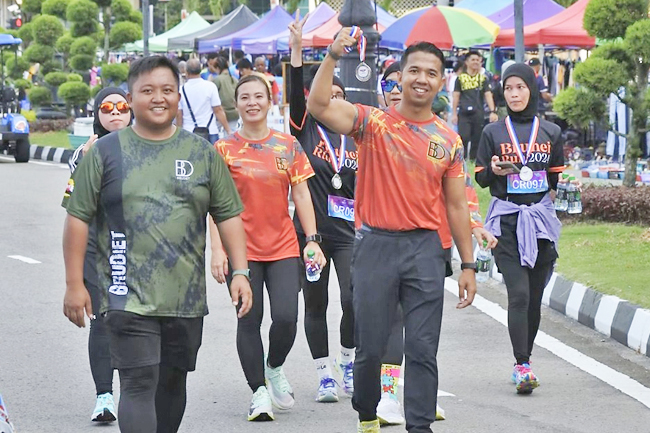Engaging in sports is one of the most effective ways to achieve pleasure and satisfaction in life, beyond fulfilling basic human needs and values.
To cultivate a society that is fit, healthy and strong both mentally and physically, it’s essential to foster enthusiasm, a positive attitude, discipline, and independence through active and voluntary participation in sports, recreational activities and physical fitness.
Moreover, sports have the power to promote social development through widespread participation, involving family members, friends, and both local and foreign communities. This encourages socialising, healthy competition and strengthens social connections, fostering a more inclusive society.
While the basic human needs encompass psychological factors and self-satisfaction, involvement in sports goes beyond just winning; it significantly contributes to overall health and well-being.
However, extreme exercise may not be suitable for everyone, especially those who haven’t exercised in a long time, the elderly, or those who are overweight.
The primary goal in maintaining personal fitness is to exercise according to one’s ability level. Brisk walking or power walking are excellent beginner-friendly sports that can be easily incorporated into a fitness routine.
Brisk walking is an excellent way to stay healthy without putting too much strain on the heart.

Even power or speed walking, considered a cardio-based sport, is highly affordable and accessible. Enthusiasts only need proper sports attire to get started, avoiding the need for a significant investment.
Despite its simplicity, brisk walking offers a multitude of benefits when done regularly. It stimulates the metabolism, burns calories, and strengthens bones and leg muscles.
For instance, walking at a moderate pace for 30 minutes can burn around 150 calories, especially when combined with a balanced diet.
Incorporating brisk walking into your routine, alongside a healthy diet, avoiding smoking, maintaining an ideal body weight, and managing stress, can significantly benefit your heart health.
It also helps in preventing non-communicable diseases such as high blood pressure, diabetes, and can boost overall immunity.
A 2023 study published in the British Journal of Sports Medicine revealed that just 11 minutes a day (75 minutes a week) of moderate-intensity physical activity, such as brisk walking, can significantly lower the risk of diseases like heart disease, stroke, and various cancers.
Cardiovascular diseases, including heart disease and stroke, are the leading global cause of death, responsible for 17.9 million deaths in 2019, while cancers accounted for 9.6 million deaths in 2017.
Moderate-intensity physical activity is known to reduce these risks, and the NHS recommends that adults engage in at least 150 minutes of moderate-intensity activity or 75 minutes of vigorous-intensity activity weekly.

To determine the necessary amount of physical activity for reducing chronic disease and premature death risks, researchers from the Medical Research Council (MRC) Epidemiology Unit at the University of Cambridge conducted a systematic review and meta-analysis.
They analysed data from 196 peer-reviewed articles, covering over 30 million participants from 94 large study cohorts, making this the largest analysis of its kind.
The findings revealed that two out of three people did not reach 150 minutes per week of moderate-intensity activity, and fewer than one in 10 exceeded 300 minutes per week.
However, the study showed that even 75 minutes per week of moderate activity provided significant benefits, including a 23 per cent lower risk of early death.
This amount also reduced the risk of cardiovascular disease by 17 per cent and cancer by seven per cent.
Certain cancers saw even greater risk reductions: head and neck, myeloid leukaemia, myeloma and gastric cardia cancers had a 14-26 per cent lower risk, while lung, liver, endometrial, colon and breast cancers had a three to 11 per cent lower risk.
These findings highlight that even minimal physical activity can substantially impact health and longevity. It should be noted that power walking is also recognised as a sport in athletics tournaments, both regional and international, especially in long-distance races.
According to an article in Prevention on the ‘15 Major Benefits of Walking’, merely covering the distance while walking can provide some health benefits, but research over the years has shown that walking at a faster pace is more advantageous for long-term health, ie Power walking.
For example, a 2006 study published in The British Journal of Sports Medicine found that individuals who walk at a brisker pace have a lower risk of all-cause mortality and heart disease-related deaths.
A recent 2021 study published in Cancer Epidemiology, Biomarkers and Prevention examined over 200,000 cancer survivors aged 50 to 71.
The findings revealed that those who walked at the slowest pace had more than double the risk of death from any cause compared to those who walked the fastest.
According to a 2019 study in Mayo Clinic Proceedings, the optimal speed to power walk is at least six kilometres per hour.
Evidently, walking sports have also become extremely popular locally, enjoyed by all age groups.
Over the weekend, it is common to see walking activities during events like Bandar Ku Ceria, involving various communities, whether individuals or groups.

These activities include participants from the government, private sector, and the wider public, fostering strong familial and friendly ties.
Regardless of the main goal, these activities ultimately aim to improve overall body health and contribute to creating a smart and healthy society. – FADHIL YUNUS


